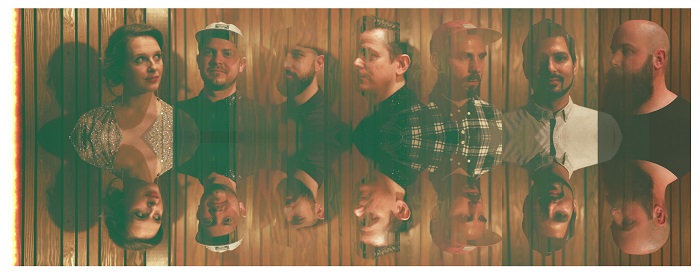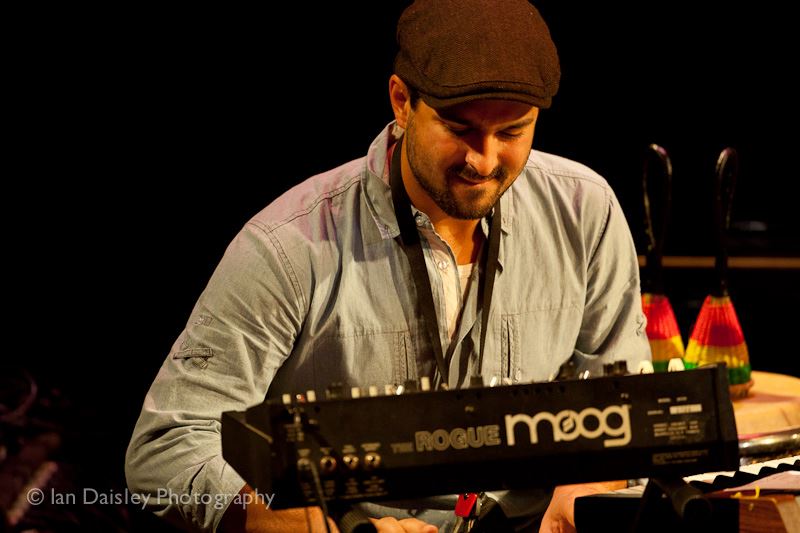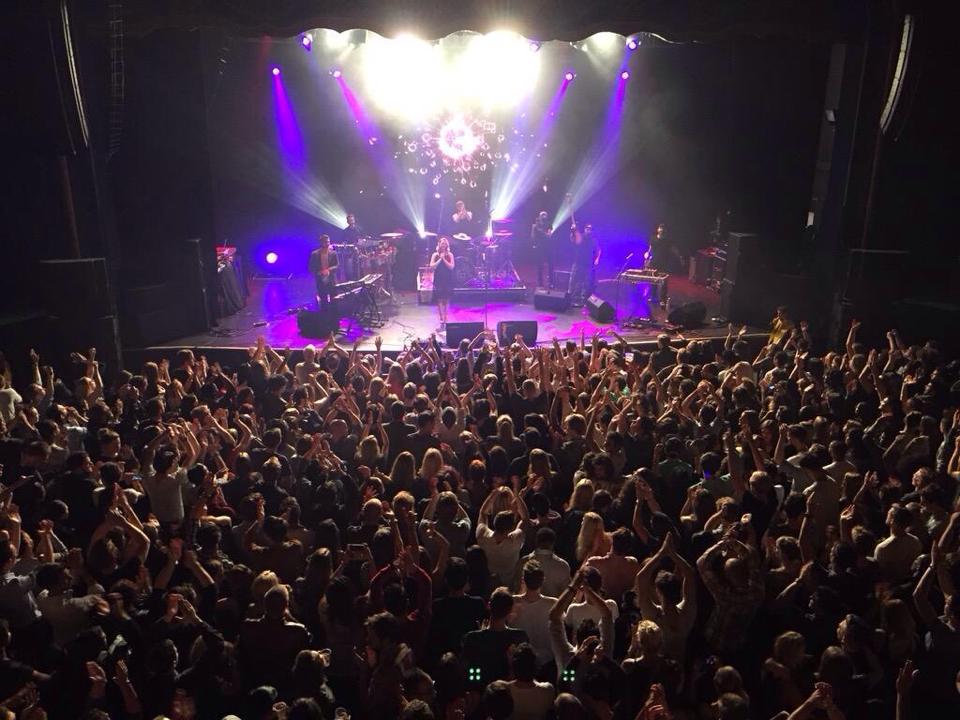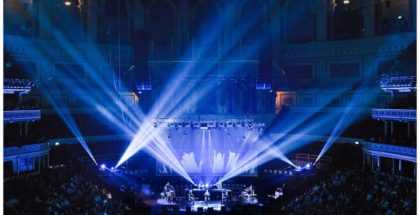A CHAT WITH: TAZ MODI (SUBMOTION ORCHESTRA)
aaamusic | On 25, Feb 2016
Jazz-electronica collective Submotion Orchestra have just released a new record – the excellent Colour Theory, out now. Ahead of a string of UK dates commencing next month, Submo’s Taz Modi (piano/keys/synths) chatted with Clive Rozario about the band’s new direction, their formation, his work with Matthew Halsall and what the future might hold…
Am I right in thinking that Tommy and Dom founded Submotion? Can you tell us a little bit about those early stages of the band and how you came to be involved?
Yeah that’s right. Tommy and Dom did a project in York Minster that combined classical music with dubstep, and once it finished they talked more about setting up a group to follow it up. I wasn’t actually the first keyboardist in the band – Bill Laurence who lived in Leeds at the time did a few jam sessions with them, but came in one day saying he’d just got a call to join a group out in the US – which ended up being Snarky Puppy! So because I’d played loads with Chris Hargreaves the bassist, and also on a few occasions with Tommy, and we all knew each other well from the Leeds scene, they asked me if I’d be interested in coming down and having a play. We spent a few months meeting in Chris’ living room, playing and writing and experimenting. Also lots of tea and biscuits, there’s a pretty high sugar intake in this band. It all seemed to come together pretty quickly, even though his living room smelt a bit.
You guys are just releasing a new record – Colour Theory. I read somewhere that there had been talk of distancing yourself from the dubstep aspect that you guys have become associated with…How would you describe the direction of the material?
I think it’s less a matter of distancing ourselves from dubstep than just naturally moving in different directions. We’ve always had lots of different influences in the mix, and over the course of the previous three albums and EPs, we’d gradually taken it away from 140bpm to cover a bit more ground. This new album is a lot more produced than anything we’ve done before – also another result of wanting to try a few different things. We’d always developed the material by playing through it together and workshopping the tunes, but decided for this to instead send everything to Dom Ruckspin for him to get stuck into. So there’s a lot less live playing on it – all the drums are programmed, less trumpet – but it felt right to experiment a little more with our sound at this stage. We’ve also collaborated a lot more on this one – we have guys like Royce Wood Jnr, Andrew Ashong, Ed Thomas and a few others, and it’s been really nice to stretch out in this way.
What are your thoughts on dubstep, generally?
Like all musical genres, there’s good and bad stuff. I guess so much of what was dubstep has been assimilated into the mainstream now that it’s a bit hard to quantify. Personally it wasn’t my scene when I joined the band, but as a massive ambient electronica fan, I was really drawn to the spaciousness and atmosphere of what Dom was doing.
Submotion Orchestra were signed by Ninja Tune imprint Counter Records a couple years ago, right? That must’ve been an amazing moment, career-wise…Have you noticed much of on impact regarding Submo’s momentum since then, or has it been business and usual?
Well it was pretty crazy to find ourselves on Ninja – I’ve been listening to stuff on the label since the early 90s so it’s always been an influence and inspiration, and the same is true for the rest of the band. And there’s definitely been a positive impact in our reach and appeal, as I think any band sees if they’re lucky enough to sign to a prestige label which people trust.
There are so many talented individuals involved in the project… I’m interested to hear about the writing and recording process involved with Submotion music, especially your contributions?
It’s a great thing to be part of such a creative group, there’s a lot of productivity – Tommy in particular is an incredibly prolific writer – and it’s a pleasure and privilege for me to be amongst some amazing musicians who all have great things to contribute. Sometimes I find myself taking it for granted a bit – you get so used to playing with some people that you can lose sight of how brilliant some musicians can be. They’re all world-class for me, no doubt about it. There’s been so much stuff written that’s never been used – we should definitely go back through the archives at some point to see what we’ve left behind. I tend to be quite slow and deliberate when I write for Submo, since it was the first time I’d written lyrics as well, which I find a slightly agonising process – words are so permanent that I throw out 95% of what I come up with. But for me the best part of writing is collaboration, I love working with Ruby to find melodies, and I love coming up with a chord sequence or programmed pattern that everyone can add their thing to.
What about your amazing singer Ruby Wood – does Ruby handle all of the lyrics and vocal melodies, or do others work on those aspects as well? And how do you guys decide whether a track should be vocal-led or instrumental?
Well lots of us write lyrics, melodies and music. As I said, Tommy’s an incredible prolific writer who can churn out lyrics and music, and a lot of the material is his. And as part of the workshopping process, a lot of ideas come from everyone – for example, there may be trumpet ideas that end up being vocal lines, or vice versa – in fact, ‘Bring Back the Wolf’s’ melody was Ruby’s, which then ended up being played by Bobby. Often we’ll write with either vocals or instrumentals in mind, that usually gets decided pretty early on in the development stage. In the stuff I’ve done with Ruby, I’ll usually have chords and feel in place, but then give it to Ruby to see where she’ll take it melodically. It’s always good to have someone to bounce ideas off – I think in writing music, though it’s hard to let go of your own ideas sometimes, there’s nothing that makes one person more right than any other, and it always a good thing to practise allowing music to take on its own life. And you’re all heading for the same place – you want the music to sound as good as possible. But I don’t want to seem like a selfless oasis of calm and tranquility – I’m still a stubborn bastard, but am trying to work on it as much as I can.
I’ve seen you guys perform so many times I’ve lost count…but I think the standout performances were at Secret Garden Party in 2014 and headlining London’s KOKO in 2013. What do you consider to be your favourite AND worst Submotion gigs, and why?
Glad you keep coming back for more. That Secret Garden one was a pretty epic one – I remember walking off stage to find Chuck D nodding sagely. That was a nice little ending to a gig. We’re back there this year too, so already looking forward to it. And the Barbican gig last year with strings and horns was something we’d always dreamed of doing since we started. We’re quite lucky to not have had too many shockers, though I remember a Croatian gig where due to some severe lack of communications between us and the monitor engineers – who spoke no English – the whole gig was a nightmare – feedback from start to finish, none of us could hear a thing properly. I think Robert Glasper’s sound guy ended up coming out of the crowd and getting on the monitors to try and help us out. So thanks to him…
Your music seems to have a whole other dimension in a live setting…what do you take into account when choosing your setlist?
We usually have a pretty firm idea of our set before we play – we’ll rehearse a particular number of tunes before each tour or festival season to make sure we’ve got some extra in case what we think will work doesn’t go across as planned. When we’re lucky enough to do sit-down gigs or jazz venues, we’ll always tailor the set so that we can play calmer or more experimental stuff that may not go down as well with bigger venues or crowds. To paraphrase David St. Hubbins of Spinal Tap, you don’t always want to perform freeform jazz explorations in front of festival crowds. Even if we’d like to.
Do you have a favourite Submotion song to perform live?
‘Hymn for Him’, ‘1968’ and ‘Thousand Yard Stare’ always do it for us.
You are also an integral part of Matthew Halsall’s various jazz bands – I may have seen you perform more times with him than I’ve seen you with Submotion! You’ve worked with him on his spiritual Gondwana Orchestra jazz project, as part of his more straightforward jazz quintet, and as part of his electronic jazz trio… Can you tell us about how you guys met and what it’s like collaborating with him?
I met Matt years ago, through our mutual friend Chip Wickham, who knew we both shared obsessions with Alice Coltrane, so saw to it that we got together. When his previous pianist went to do his own thing, I was lucky enough to be asked to fill the role – that was around 5 years ago now. It’s another thing where we’ve played so much that I almost take it for granted sometimes to play with these incredible musicians like Luke Flowers [of The Cinematic Orchestra], Gavin Barras and Rachael Gladwin. So when I get aware to what they’re doing on stage, it’s a pretty good feeling. I love what Matt does – for me his approach to his music is truly honest and pure, and considering how much music these days is made with less pure reasons in mind, that’s always something that’s impressed me about Matt.
I’ve always wondered what happened to the electronic jazz stuff you guys were working on… I saw you showcase a kind of bass-heavy electronic sound as part of the Matthew Halsall trio at the Cockpit Theatre, the Roundhouse (as part of Mr Scruff’s all-dayer) and on the beach at Dimensions Festival in Croatia. It sounded like it owed a fair amount to the sound you’ve honed with Submotion. Any plans to record and release any of it?
For now, it’s on the backburner, solely because we’ve all got so much going on that it’s proved hard to give it the attention it needs. But something will happen with it I’m sure. We did some great gigs though, and it was lovely too to collaborate with Scruff on his last album, so that all worked out quite nicely.
Jazz seems to be in a pretty healthy place at the moment, with lots of excellent new artists emerging and arguably pushing things forward. What are your thoughts on the UK jazz scene at the moment, generally?
There’s amazing stuff going on in the UK right now with jazz, and I think it’s reached the point where the style of music alone doesn’t mean you have to play solely to the crowds who follow that music. With promoters like Soundcrash, of course DJs like Gilles Peterson and so on, you’ve got a whole scene where you can have electronic acts, jazz acts, hip-hop acts, ‘world’ acts all alongside each other, all bringing the best out of each other and all being followed by a crowd who are embracing the differences and appreciating the similarities. Though of course recorded music has its problems and difficulties, in terms of playing live and getting genre-crossing acts to perform to people, I think things are in good health right now.
Would you ever consider performing and recording under your own name? And if you did, how would it sound? Electronic? Traditional Jazz?
I’d always written little things throughout the years, solo piano pieces with ambient electronic textures. And as I built up a bunch of tunes, I kept thinking recently that it was time to go a little further with it and give it some attention. So I’m actually just putting the finishing touches to a full solo album. Something will be coming soon – watch this space.
Is there any kind of genre that you haven’t had a chance to record or perform, that you’d love to work with some day?
I love all styles and sounds of music, but I think i’ve probably got enough going on at the moment to keep me occupied.
Finally: piano or keyboards?
As long as the music’s coming from the right place, doesn’t really matter.
Questions answered by Taz Modi of Submotion Orchestra…






